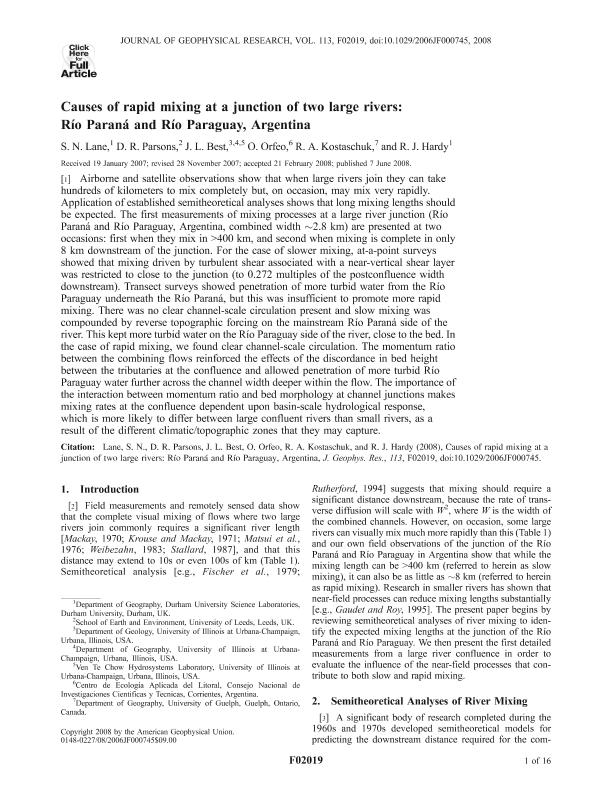Mostrar el registro sencillo del ítem
dc.contributor.author
Lane, Stuart N.

dc.contributor.author
Parsons, Daniel R.

dc.contributor.author
Best, James L.

dc.contributor.author
Orfeo, Oscar

dc.contributor.author
Kostaschuk, R. A.
dc.contributor.author
Hardy, Richard J.

dc.date.available
2018-02-22T19:37:37Z
dc.date.issued
2008-06
dc.identifier.citation
Lane, Stuart N.; Parsons, Daniel R.; Best, James L.; Orfeo, Oscar; Kostaschuk, R. A.; et al.; Causes of rapid mixing at a junction of two large rivers: Río Paraná and Río Paraguay, Argentina; Blackwell Publishing Ltd; Journal of Geophysical Research: Earth Surface; 113; 2; 6-2008; 1-16
dc.identifier.issn
2169-9011
dc.identifier.uri
http://hdl.handle.net/11336/37002
dc.description.abstract
Airborne and satellite observations show that when large rivers join they can take hundreds of kilometers to mix completely but, on occasion, may mix very rapidly. Application of established semitheoretical analyses shows that long mixing lengths should be expected. The first measurements of mixing processes at a large river junction (Río Paraná and Río Paraguay, Argentina, combined width ∼2.8 km) are presented at two occasions: first when they mix in >400 km, and second when mixing is complete in only 8 km downstream of the junction. For the case of slower mixing, at-a-point surveys showed that mixing driven by turbulent shear associated with a near-vertical shear layer was restricted to close to the junction (to 0.272 multiples of the postconfluence width downstream). Transect surveys showed penetration of more turbid water from the Río Paraguay underneath the Río Paraná, but this was insufficient to promote more rapid mixing. There was no clear channel-scale circulation present and slow mixing was compounded by reverse topographic forcing on the mainstream Río Paraná side of the river. This kept more turbid water on the Río Paraguay side of the river, close to the bed. In the case of rapid mixing, we found clear channel-scale circulation. The momentum ratio between the combining flows reinforced the effects of the discordance in bed height between the tributaries at the confluence and allowed penetration of more turbid Río Paraguay water further across the channel width deeper within the flow. The importance of the interaction between momentum ratio and bed morphology at channel junctions makes mixing rates at the confluence dependent upon basin-scale hydrological response, which is more likely to differ between large confluent rivers than small rivers, as a result of the different climatic/topographic zones that they may capture.
dc.format
application/pdf
dc.language.iso
eng
dc.publisher
Blackwell Publishing Ltd

dc.rights
info:eu-repo/semantics/openAccess
dc.rights.uri
https://creativecommons.org/licenses/by-nc-sa/2.5/ar/
dc.subject
Mixing
dc.subject
Junction
dc.subject
Paraná
dc.subject
Paraguay
dc.subject.classification
Meteorología y Ciencias Atmosféricas

dc.subject.classification
Ciencias de la Tierra y relacionadas con el Medio Ambiente

dc.subject.classification
CIENCIAS NATURALES Y EXACTAS

dc.title
Causes of rapid mixing at a junction of two large rivers: Río Paraná and Río Paraguay, Argentina
dc.type
info:eu-repo/semantics/article
dc.type
info:ar-repo/semantics/artículo
dc.type
info:eu-repo/semantics/publishedVersion
dc.date.updated
2017-12-04T17:34:40Z
dc.journal.volume
113
dc.journal.number
2
dc.journal.pagination
1-16
dc.journal.pais
Estados Unidos

dc.description.fil
Fil: Lane, Stuart N.. University Of Durham; Reino Unido
dc.description.fil
Fil: Parsons, Daniel R.. University Of Hull; Reino Unido
dc.description.fil
Fil: Best, James L.. University of Illinois. Urbana - Champaign; Estados Unidos
dc.description.fil
Fil: Orfeo, Oscar. Consejo Nacional de Investigaciones Científicas y Técnicas. Centro Científico Tecnológico Conicet - Nordeste. Centro de Ecología Aplicada del Litoral. Universidad Nacional del Nordeste. Centro de Ecología Aplicada del Litoral; Argentina
dc.description.fil
Fil: Kostaschuk, R. A.. University of Guelph; Canadá
dc.description.fil
Fil: Hardy, Richard J.. University Of Durham; Reino Unido
dc.journal.title
Journal of Geophysical Research: Earth Surface

dc.relation.alternativeid
info:eu-repo/semantics/altIdentifier/url/http://onlinelibrary.wiley.com/doi/10.1029/2006JF000745/abstract
dc.relation.alternativeid
info:eu-repo/semantics/altIdentifier/doi/http://dx.doi.org/10.1029/2006JF000745
Archivos asociados
